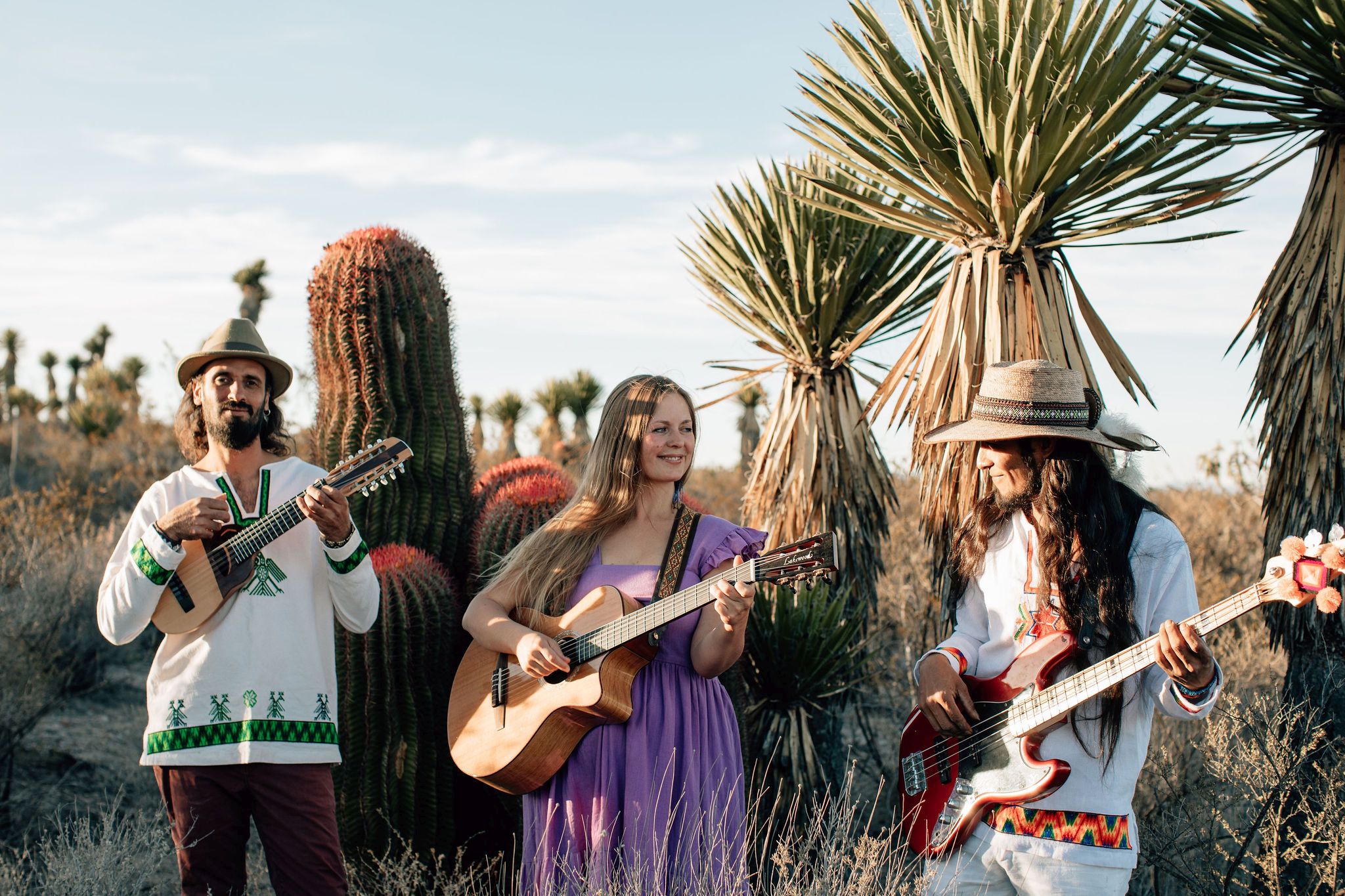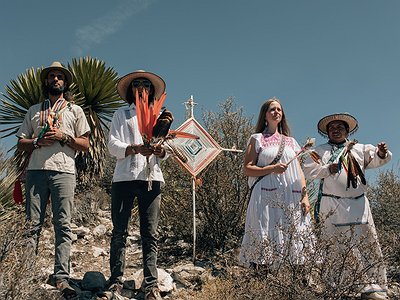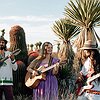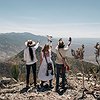Name: Curawaka
Members: Anna Bariyani (vocals, guitar, hand drum, shakers), Tavo Vazquez (charango, quena, sikuri flutes), Alberto Arroyo (guitar, bass)
Interviewee: Anna Bariyani
Nationality: Norwegian (Anna), Argentinian (Tavo), Mexican (Alberto)
Current release: Curawaka's Dreamtime is out now.
If you enjoyed this Curawaka interview and would like to keep up to date with the band and their music, visit their official homepage. They are also on Instagram, and Facebook.
When I listen to music, I see shapes, objects and colours. What happens in your body when you´re listening? Do you listen with your eyes open or closed?
The music fills me and moves me. I feel connection. To myself, my heart, to my emotions. I feel movement in my being, I open up.
I might feel a myriad of different energies or emotions, depending on the music, but most importantly: I feel connection. I feel alive.
What were your very first steps in music like and how would you rate the gains made through experience - can one train/learn being an artist?
Music has always been a part of my life and I always loved to sing. It has always excited me, made me feel happy and joyful. As a child I loved to sit around the fire with my parents and their friends and hear the guitar and everyone singing the same songs.
You can certainly train as a musician and it will usually give an advantage… but the magic of music comes through connection. And you can bring that connection in the simplest way, without any training. The connection cannot be trained. It comes through some other mysterious form.
According to scientific studies, we make our deepest and most incisive musical experiences between the ages of 13-16. What did music mean to you at that age and what’s changed since then?
Growing up I would listen to my parents´ records, 60s rock, folk and protest songs mainly. Around 13 I started investigating other genres and I listened a lot to heavy metal between 13-16.
It was a nice sound to release the teenage frustration I was feeling. I wouldn’t say those years made any deeper impact on me than other years.
Where does the impulse to create something come from for you? What role do often-quoted sources of inspiration like dreams, other forms of art, personal relationships, politics etc play?
It comes from being moved. When I get that feeling about being deeply touched, then I want to honor that by writing about it. Or it inspires me to give that feeling a shape in a melody, or a story through words.
Somehow that feeling becomes a whole little universe. It is quite beautiful.
Paul Simon said “the way that I listen to my own records is not for the chords or the lyrics - my first impression is of the overall sound.” What's your own take on that and how would you describe the sound you're looking for?
Yes, absolutely. The overall sound, and whether the vibration of the song comes through properly. Whether the spirit of it can be felt. At the end that’s all that matters.
Are you acting out certain roles or parts of your personality in your music which you couldn't or wouldn't in your daily life? If so, which are these? If not, what, would you say, are the key ideas behind your approach to music?
I can relate to artists talking about alter ego.
But I think for me I am acting out my higher self in my music. Not consciously, but because of the deep prayer that is in the centre of the music we make.
Music is a language, but like any language, it can lead to misunderstandings. In which way has your own work – or perhaps the work of artists you like or admire - been misunderstood? How do you deal with this?
Making art and offering it is always vulnerable. People will opinionate (often ruthlessly) about the art of others and it is dangerous to consider that when you create art.
You have to trust your direct connection to the source of your inspiration. Creating art is between you and spirit. If you tailor your art to fit the liking of others, it is not art anymore. Because it does not come from the source. 
Curawaka Interview Image (c) the artist
Making music, in the beginning, is often playful and about discovery. How do you retain a sense of playfulness as things become more professionalised and how do you still draw surprises from equipment, instruments, approaches and formats you may be very familiar with?
Keep the connection to the source fresh. Not let my inner well run dry. Keep being inspired, and always returning to silence as a «reset». Silence is always true.
When music is coming out of me in a manner that is not authentic, then I need to be silent again. Allow my creativity to have cycles of sprouting, growth, blossoming, decaying, death, and rebirth. Work with that creative cycle and allow my heart to express what its truth at all times.
Never sing crowd pleasers unless they are also pleasing my own heart. Connecting with gratitude for having the possibility to even have a voice.
Sound, song, and rhythm are all around us, from animal noises to the waves of the ocean. What, if any, are some of the most moving experiences you've had with these non-human-made sounds? In how far would you describe them as “musical”?
I love how a frozen lake sings. This alien and yet so familiar sound. It resonates very deep with me. Also how the blackbird sings after rain on a spring day.
Or whale song. I listened to whale song during the birth of my daughter, and it allowed me to ride contractions without pain killers. It turned me into a birthing buddha. And the sound of the small creeks running after a long frozen winter. Or the gentle breeze in the dessert, which whispers so wisely.
Nature offers cosmic symphony - the finest music there is in I would say.
There seems to be an increasing trend to capture music in numbers, from waveforms via recommendation algorithms up to deciphering the code of hit songs. What aspects of music do you feel can be captured through numbers, and which can not?
I don't know much about that, but I guess numbers can be codes and portals and keys just like a voice or an instrument can be. All numbers have their own vibration, so I can see the fascination about putting sound to certain significant numeric constellations.
There is surely magic in numbers, just like there is in music, but I don’t feel or know much about that connection.
How does the way you make music reflect the way you live your life? Can we learn lessons about life by understanding music on a deeper level?
Absolutely. We are creative beings, we live by the creative principle. We are creators. The creation is how the creator shapes his/her creativity. It gives itself expression.
So it absolutely reflects who we are and what is important to us.
Curawaka Interview Image (c) the artist
We can surround us with sound every second of the day. The great pianist Glenn Gould even considered this the ultimate delight. How do you see that yourself and what importance does silence hold from your point of view? What role do headphones play for you in this regard?
All life is vibration and all vibration have sound. There is a sonic web around us at all times, just like water to a fish. We are literally woven into life as sound. Even silence is rich with sound, we just can't hear it.
Nature creates harmony in the sonic field. Harmony makes us feel good and I believe supports good health and well-being. I believe certain places and ambiences can have a dissonant sonic field, which can settle in us too if we spend too much time there. I believe the dissonances can make us ill if we linger in it for a long time.
I also believe the harmony present in for example nature can change our frequency and make us harmonious again. That’s why we seek nature when we feel upset. Or why it helps to take a walk. The fresh air will bring harmonious sonic vibrance which makes us harmonious again.
If we allow the idea that sound can be harmonious (or dissonant) on a vibrational level, and that this can have a direct influence on our health and well-being, it is clear that sound and music can be medicine. This is the underlying assumption of so-called medicine music, a genre which I myself belong to, somehow.
Do you feel as though writing or performing a piece of music is inherently different from something like making a great cup of coffee? What do you express through music that you couldn't or wouldn't in more “mundane” tasks?
It depends. I guess somebody could make a cup of coffee with a connection of creativity and inspiration that a musician makes music, or a painter paints a painting. I would love to try it!
I know in my life, I do not have the same transcendental connection present in me when I make coffee as I do when I make music. But maybe there are baristas who move the mystery with their beans and latte art, why not?
Every time I listen to “Albedo 0.39” by Vangelis, I choke up. But the lyrics are made up of nothing but numbers and values which don;t appear to have any emotional connotation. Do you, too, have a song or piece of music that affects you in a seemingly counterintuitive way – and what, do you think, is happening here?
Magical principles of numerology perhaps have an otherworldly sound that appeals to our soul? If it makes you choke up, it clearly hits a nerve, and clearly has an emotional connotation, innately or by your association to it.
I can get extremely moved by hearing songs sung in languages I don’t understand. But I can feel the energy, and it moves me.
It is mportant to remember that music is not (only) intellectual - it is emotional and even spiritual. Our soul responds to music, and the mysteries of our souls and spirits are too great to really conclude what’s happening. But clearly there is a connection - which is why «seemingly counterintuitive» music can move us.
If you could make a wish for the future – what are developments in music you would like to see and hear?
I would love for there to be more authentic expression in music, and especially popular music. I believe the hunger for authenticity is getting stronger amongst more and more people, and this is good.
We have been allowing ourselves to stay masked for too long.






